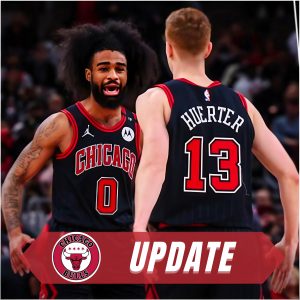The Bulls failed to make the playoffs for six straight seasons after The Last Dance in 1998.
Chicago’s front office knew a culture change was necessary to compete at a high level once again.
In the 2004 NBA Draft, the Bulls fully embraced a youth movement. This shift ushered in a new era for the team: the Baby Bulls.
The Baby Bulls started the 2004-05 season with nine straight losses but finished as the fourth seed in the Eastern Conference. Led by their young players, the Bulls made the playoffs for the first time since Michael Jordan retired. The organization and its fans finally had hope for the future.
Now, exactly 20 years after the 2004-05 NBA season, the Chicago Bulls find themselves in a similar situation. After 10 years without a playoff series win, the Bulls have once again shifted toward a youth movement.
The Baby Bulls era is back.
Bulls’ YOUTH MOVEMENT
The youth movement began in the offseason. Chicago traded 34-year-old DeMar DeRozan to the Kings and 30-year-old Alex Caruso to the Thunder. In return for Caruso, the Bulls acquired 21-year-old Josh Giddey.
Coach Billy Donovan has completely revamped the team’s playing style this season. DeRozan played a league-high 37.8 minutes per game last season, and the Bulls were a bottom-three team in pace. This season, Chicago is pushing the pace, ranking top three in the league in possessions per 48 minutes.
The Bulls are using their youth to their advantage, turning each game into a track meet. Nuggets coach Michael Malone commented on Chicago’s playing style before their game on Monday.
The Bulls got even younger at the trade deadline. They traded 29-year-old Zach LaVine for 27-year-old Zach Collins, 25-year-old Tre Jones, 26-year-old Kevin Huerter, and their own 2025 first-round pick. Many Bulls fans were upset with the return for LaVine, but the trade signaled the front office’s long-term plans.
The Bulls did not want to acquire another star player who would have an immediate impact because they are focused on a multi-year rebuild. Instead, they traded for flexibility and security. Chicago now owns its first-round pick for the next seven drafts, and by turning LaVine’s expensive contract into three smaller contracts, the Bulls gained more financial flexibility.
The average age of the Bulls’ starting lineup is 25.6, which includes 34-year-old Nikola Vucevic. The team is led by its young players, just as it was 20 seasons ago.
CULTURE SHIFT
With the youth movement came a culture change.
The focus shifted from “win now” to developing younger players. Coby White’s role has expanded, and he is thriving. Giddey, at just 22 years old, has shown top-10 point guard potential. Matas Buzelis is guarding Hall-of-Fame players while earning consistent minutes in the starting lineup.
The culture shift has led to wins. The Chicago Bulls are 8-2 over their last 10 games and are securely in the play-in tournament. Chicago has been in the play-in the past two seasons, but this year is different.
The Bulls are not trying to contend right now. LaVine and DeRozan are not carrying the team into the ninth seed. Instead, it’s White, Buzelis, and Giddey. In other words, this isn’t the ceiling for this team— it’s the beginning.
The team’s chemistry and culture extend off the court. Ayo Dosunmu is vlogging behind the scenes, and players are sharing memes and highlights of each other on social media.
the vibes
(
: matasbuzelis/IG) pic.twitter.com/BQ2lChiGsH
— Bulls on CHSN (@CHSN_Bulls) March 25, 2025
This year’s team is strikingly similar to the Baby Bulls from 20 years ago. The Baby Bulls era ended with the selection of Derrick Rose in the 2008 draft. Rose propelled an already strong Bulls team into a top contender before his injury. The sky is the limit for Chicago if they get lucky in the draft lottery, as they did in 2008.
After years of mediocrity and a bleak future, Bulls fans finally have something to look forward to.






